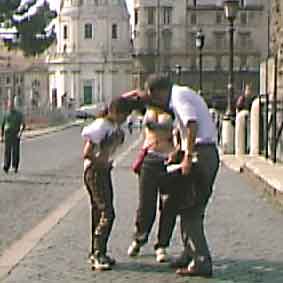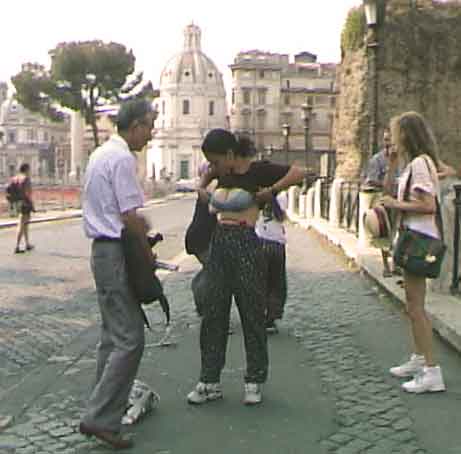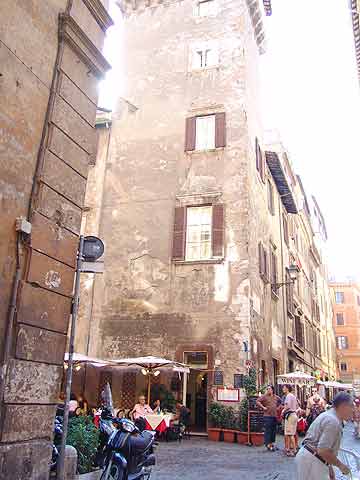
Bob and I began our field research on street thievery in 1993, when we quit our steady jobs in Las Vegas to combine freelancing with travel. As our work took us around the world, we got into the streets, among the tourists, in cities and at historical sites, watching who was watching the visitors. Our early successes gave us an enormous charge and encouragement to continue. We were hooked on tracking. But I don’t think either one of us believed, in the beginning, that we’d succeed in identifying so many perpetrators.
Rome was our teething ground as pickpocket hunters. We began with modest ambitions. We’d hang out at the Coliseum in hopes of photographing child and teenage pickpockets, who had become easy for us to recognize. They’d always carry a section of newspaper or, better for its stiffness, a slab of corrugated cardboard, with which they’d shield their dipping hands. Although the Coliseum was sometimes crawling with Carabinieri with not a thief in sight, we soon built up a healthy portfolio of red-handed-children on film and footage.
The following year, 1994, we were decked out like pros. We lugged a video camera monster, a JVC 3GY-X2U, which is 24 inches long and weighs 25 pounds without its case. I wore a battery belt of about 30 pounds, which threatened to slip off my hips if I didn’t keep a hand on it. Bob carried the camera and a huge, heavy tripod. In addition, we needed my purse, a 35mm camera, and a bag of video accessories. Thus burdened, we traipsed around the ancient city, filming ruin after ruin, milling crowds, establishing shots, and potential danger zones (pickpocketly-speaking).
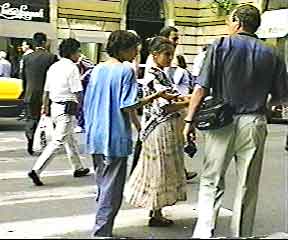
We usually began with the intention of filming the elusive urchin pickpockets who seemed always to congregate around the Coliseum, often in large family groups. But they, apparently, were polar opposites to video cameras, which repelled them in a great radius. I wondered that year if the police knew about this great tool for clearing the area of crime.
Sometimes we’d get a few minutes of unexciting footage and I’d take a few stills. Eventually, our prey would escape into the subway or onto a bus. We’d decide to go to the Spanish Steps, another popular venue for a theft-show. Then, perhaps in an alley or side street, a couple of girls carrying cardboard and babies would pass us. We’d about-face and follow stealthily, keeping downwind as if they were big game animals who might sniff us out. We’d get plenty of footage and photos before they’d notice us, then still, we’d follow. Round and around the back streets of Rome, we’d tail as they’d lead. But we’d no longer try to hide, and they wouldn’t dare try to steal.
Eventually we’d give up on the girls and go back to the exclusive shopping streets around the Spanish Steps. The area is always mobbed with tourists, and with police, too. If there was nothing happening, off we’d go to Trevi Fountain, another popular spot.
We were exhausted by the end of those days. If we hadn’t found much to raise our spirits, I’d be dragging around like nothing more than a pack animal pining for its stable. Except for quick lunches and a few standing-up coffees, that’s how we spent countless ten-hour days in Rome. True, it’s cheaper than shopping!
One day, on our way toward Trevi Fountain from the Spanish Steps, we spied a gang of suspect children. A pregnant girl of about 16 led the younger ones. Each carried a large square of cardboard, announcing their intentions. Incredibly brazen, they tried for the pockets or purses of tourists every few yards, but with little success. The children eventually noticed us and our huge, tv-news-style camera, but we continued to follow. They were confused by our interest in them. Why were we following? Why taking photos?
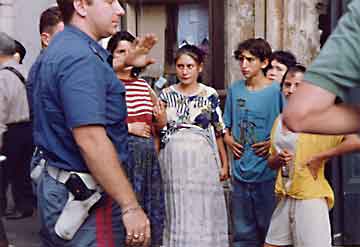 Finally, they came right up to us and asked. But as they spoke no English, we just waved them away. No polizia, we said. They walked on, pausing to try for pockets here and there, and every once in a while tried to duck away from us. We remained close behind. Then, just as they tried for a man’s pocket, a police car zoomed up, officers jumped out, and the kids were rounded up against a wall. The police questioned them angrily while the kids pointed accusingly at us. Bob kept filming. One officer grabbed the kids’ cardboard squares and threw them into a corner. They let the kids go, shooed them away as they were all too young to arrest, and drove off. We waited. Sure enough, the scoundrels came back for their cardboard and we all continued where we’d left off. They led, we followed and filmed. Eventually, they ditched us.
Finally, they came right up to us and asked. But as they spoke no English, we just waved them away. No polizia, we said. They walked on, pausing to try for pockets here and there, and every once in a while tried to duck away from us. We remained close behind. Then, just as they tried for a man’s pocket, a police car zoomed up, officers jumped out, and the kids were rounded up against a wall. The police questioned them angrily while the kids pointed accusingly at us. Bob kept filming. One officer grabbed the kids’ cardboard squares and threw them into a corner. They let the kids go, shooed them away as they were all too young to arrest, and drove off. We waited. Sure enough, the scoundrels came back for their cardboard and we all continued where we’d left off. They led, we followed and filmed. Eventually, they ditched us.
Excerpt from Travel Advisory: How to Avoid Thefts, Cons, and Street Scams
Chapter One (part-j): High and Dry on the Streets of Elsewhere




